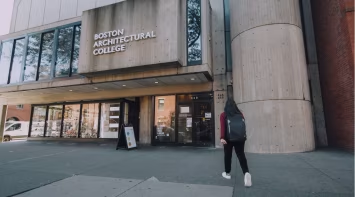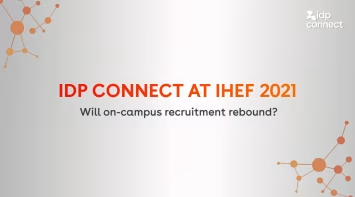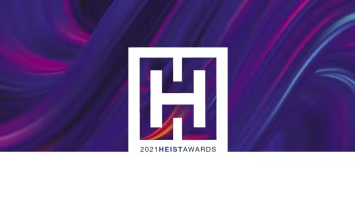With over a decade in higher education within the public and private sector as well as internationally, Rachel MacSween has gained a wealth of experience across the industry. Joining IDP Connect earlier this year was a pivotal moment in Rachel’s career and now she brings her dynamism, expertise and passion for universities and students right to the heart of the organisation.
Private vs. Public
With much of your career spent working within universities you recently decided to make a change and move directly into the private sector. What prompted this move?
I think there has always been a perception that the public sector and private sector are very different but, over the last few years, universities have really had to change their commercial thinking because it is so competitive now with Australia being a popular destination for students. And equally with Canada being a popular destination, the Australian marketplace has had to really change how it positions itself and how they do business. So, it didn't feel like as much of a jump as perhaps it might have done three or four years ago to move from the public sector to the private sector, because a lot of the techniques being used are the same. We are trying to make sure that we are doing the right thing for our clients - for us that is the universities and for the universities that's their students and their agents. Everyone benefits. But I just felt like the pandemic really brought out the best in universities and it brought out the best in valued partners. When I was working at the University of York, IDP was a really valued partner and I would not have left that job for many people. However, the role at IDP was really attractive because it was working with people that I knew. I had been on the advisory panel for five years. I was going to work with people I'm inspired by, and I continue to be inspired by. It was kind of a perfect situation where I probably hadn't been in the last job as long as I'd intended to stay but the opportunity to come somewhere like IDP Connect, who really repositioned themselves over the last four or five years was too tempting to turn down.
Moving to IDP
Can you share some of the reasons you decided to take up a role within IDP specifically at this point in your career?
Yes! I have been in higher education now for about 12 years working in the pathway sector, which was in private sector, and then going into two roles: one at the University of Strathclyde, and then a step up to the role of Director of International at the University of York. I did that for two years through the pandemic. I learned on the job very quickly, we had to be agile in the way we were doing things and move at pace. I feel like the experience that I have so far and the situations we've had to live through - including the removal of the post-study work visa back in 2010 and then obviously Brexit and the pandemic – has provided me with a good set of skills that I could transfer into a job at this level at IDP. It wasn't a push away from the institution I was at, I really loved working there and I had a brilliant team, but it was the fact that I was able to take all the experience from the last 12 years working in higher education into a really defined role here for me at IDP, and the company are really into making sure that I can explore the role in the way I really want to. This means thinking about the direction of IDP Connect and how we work best for universities we're working with and their students.
Student Satisfaction
What are some of the key differences you have discovered between the public and private HE sectors in terms of achieving student satisfaction?
The biggest difference between public and private is the speed of ability to change. And with an organisation like IDP, you could have ten good ideas and ten of them get approved. And you then run with those but with universities you can share good ideas, but it can take a long time to get those approved so sometimes you end up only running with five of them or fewer. Ultimately both the private and public sector want the best for the students, but the private sector can get there quicker. They can respond quicker to changes in technology. I think about students that are sitting with their smartphone and ordering food on Uber Eats and watching something on Netflix - they're used to really high levels of functionality on their mobile devices. If you look at what IDP Connect has done in the last few years, our move to IDP Live was done relatively quickly and the functionality within the app is incredibly slick and personable. The app allows students to really engage with institutions in a very sophisticated way. Universities would take a lot longer to get there just because of the massive amount of demand on their development teams. Their technology teams are looking after the entire institution, so while universities want the best for the students, it sometimes takes a long time for them to get to the right solution and in that time more things could have changed. So, it's about the speed of response.
The private sector is set up better for being able to respond quickly to student needs. It appeals to me to come somewhere students are first and students are definitely first at IDP. And I've read that and I've heard it but now I'm living it and I really see what the organisation means when it says that. It’s not just about making sure the students choose the institution they want to go to without any pressure from our counsellors, but we actually put them first when we're thinking about the technological changes we will be making to the organisation. Will it benefit the students? Will it benefit our clients? Then let's do it. I mean, we move quickly. And we've got teams enabled in Chennai, the UK and globally that are ready to go. And that's probably the biggest difference, the pace here is a lot different than I've experienced elsewhere.
International Higher Education
Having spent a great deal of time studying and/or working at Scottish, English and Australian universities, you have gained a wealth of experience in the higher education sector globally. What insights can you share on various international higher education sectors?
If I think about Scotland, it's a different education system than England and Wales. So, it's a longer degree programme - four years for undergraduate degrees. We are selling quite a different model internationally and it is aligned with the US. People aren't put off by the four years, but it's just when you're trying to sell a four-year degree versus a colleague from England trying to sell a three-year degree, technically it is a more expensive product because you've got an extra year of tuition fees and living expenses. So, a lot of the time in Scotland, it's a form of objection handling as well as selling the value proposition of the quality of education in Scotland.
Scotland has a full range of institutions from the Russell Group and global brands like St Andrews or the University of Edinburgh, to some of the more technical colleges and the post-92 institutions. I'm a graduate of a Scottish post-92 institution and they’ve got great disciplines that they offer that maybe aren't as well ranked but they have a real focus on student experience. People were always put off by the thought of the weather - I was really amused when people said, “I'm not going to come to Scotland because it's cold, but I would go to Manitoba in Canada.” You're thinking, ‘oh my goodness, it gets down to -25°C in Manitoba’! Some of those things were just a bit more about awareness of the Scotland brand. The government worked extremely hard on the Study in Scotland brand, which was a consortium brand for the whole sector. It was around making sure people understood the benefits of studying in Scotland overall.
Then working in England at the University of York. York’s in the Russell Group of universities and I hadn't worked in the Russell Group before. I hadn't really appreciated how that badge of honor would benefit us from a recruitment perspective because there's just an association with the Russell Group that it is quality that you're going to get. That, combined with a great student city, was the appeal of York. The Russell Group status was enough to kind of pull your brand forward to a certain point, and then obviously you've got to distinguish yourself, but it was just a different type of sale. You didn't have quite as much objection handling. People really understood what the Russell Group was and then wanted to make applications because of that.
Australia was interesting because I was doing domestic recruitment so suddenly, I was propelled into a world where I was having to learn the Australian education system and recruit domestic students to come into the pathways. I loved living in Melbourne. It’s a brilliant place to live and it's easy to sell Melbourne as a city and as a destination because it's diverse with a brilliant music scene, food scene, sports scene and part-time work opportunities. At that point, the graduate route there was much stronger than the graduate route in the UK. Students could stay back for two years. More students would come with residency on their minds and working through different techniques to be able to become permanent residents. I didn't have any of that concern necessarily because a lot of my work was looking at domestic recruitment and that was an interesting situation because I was trying to recruit domestic students into essentially a private pathway.
More students in Australia will apply and use the Commonwealth Fund for their fees. They weren't eligible for that when they were coming through the pathway so you had to then sell a different type of finance package. You also had to sell the understanding that they were coming into a college environment as opposed to directly into the university. I think pathways are an amazing opportunity for students to really find their feet at university, get to understand their learning style where their gaps are, but then transition to the university with no extra time because often they do that foundation year instead of first year. But that's a different mindset for domestic students because most of the time they want to apply directly to the university. So again, it was a little bit of objection handling because students would say, "I don't want to come to a pathway”. So, it was just about being able to have that conversation and working with school networks to really building those relationships. And that's the key thing.
Overall, it's about being clear on the value proposition, on what you're selling and what you're not selling. Lastly, building the right relationships, whether that's with partners like IDP Connect and IDP or high schools locally in Melbourne or international universities that you can develop partnerships and articulation agreements with. People are at the heart of everything we do, and I think you can layer in all the experience around different channels of recruitment and different ways of doing it. But ultimately people buy people and I think that's the big thing about IDP Connect is the people here really take a lot of time to understand their clients, understand what they want, and then work with them on that basis as opposed to just selling them a product off the shelf.
Current Trends & Technology
What are some current trends that we should all know about in the HE sector and how will tech be at the forefront of the future of HE?
I think there’s two things that are coming through from the work we're doing with our clients currently. One is the overreliance on individual markets, and I think that's particularly true of higher ranked universities that are very reliant on China. There's a concern around changes with Chinese policy and we're seeing some of the restrictions that are being placed on our Chinese students. The concern around what overreliance on one market means is not just commercial but also about student experience. If you have one nationality group that's dominant in your international student community, it's not a particularly great student experience for them, nor the students that are not from that background. Balancing the population of students across different nationalities is important. The second thing is there's a huge rush of applications that have come in, particularly from India and Nigeria, because these students are interested in utilising the graduate routes, which is the government scheme, it’s fantastic that we've got that back. We did notice a huge decline in new markets when Theresa May removed the post-study work visa and at the same time our friends over in Canada introduced their study work visa - lo and behold Canada boomed and continues to boom. We're trying to play catch up a bit in that space in the UK, but what that means is that the admissions teams and institutions are on their knees with the volumes of applications that are coming through.
That's where tech can play a massive part, we have our FastLane service at IDP, which is students coming through our app or working with a counsellor in our offices. Students enter their details into the app and they're given an offer in principle for institutions based on their profile. They put in their grades, English language scores, what they want to study and then the offer in principle comes through the app saying you've been given an offer in principle for the University of Nottingham or the University of Cardiff for instance. One of our counsellors will work with the students to make sure that their paperwork's in place and that they've got all the right documents - so that's where tech and our unique agent network can play a role together. But I think many universities are leaning on tech to really help with application volume, verification of documents, things like CAS compliance which means students are having a very smooth process through the application journey.
If we go back to the Netflix or the Uber analogy, students are used to things looking slick and being done in a sort of programmatic and progressive way. It's quite difficult for students to check the progress of an application without emailing an inbox, which already has thousands of emails in it because everybody else is doing the same thing. So, I think tech can play a role in taking some of the weight out of the process, but we would never compromise having our agent network as they play a huge role in speaking to the students and their families. That's where the unique IDP model really comes into its own. We're employing tech with FastLane, but we're then backing that up with our extensive human expertise. And that's 1500+ counsellors in over 34 countries. It’s amazing because that's the balance you want. There are things that technology does well, but there are things that people do better. And it's about being able to categorise those two things and weigh them up against each other.
Next Steps, New Horizons and Self-Development
What are you most enjoying about IDP Connect so far and what are you most excited for in your next few months here?
I think what excites me the most is the learning curve. And I know it sounds kind of perverse! I’ve already worked with IDP as part of the International Advisory Panel for five years and as an agent for 12 years so I felt like I knew what I was walking into. But then I walked through the door on my first day and realised that I know about 2% of what happens at IDP. The organisation is vast and so ambitious, where it's come from in maybe the last five years since the merger of IDP and Hotcourses to create IDP Connect, and now the network is leading through technology innovations like FastLane and our digital campus in Chennai. It puts us in a unique space in that we can grow in a sustainable and measured way because technology is supporting this growth. And that's exciting because I look around the sector and there's lots of competition particularly within EdTech but we're not really in that category because of the unique model we have. We're in a bit of a category of our own and I love the fact that there's a challenge coming in. But I think challenge is healthy and I love the fact that there are people coming in and offering different models and different ways of doing things.
That's how we all learn and that's how we all grow. I think it’s about being able to then stay wedded to our principles, which is student-first, and making sure that our clients know that we are working hand-in-hand with them to raise their brand profiles in their chosen markets. It’s also about getting the right students coming through the application funnel, ideally using FastLane, and then getting quality applications at the end of that process. I'm really enjoying seeing that come to life because, as I said, I thought I knew it, and I thought I understood what IDP stood for, and being on this side of the fence I now know that is true. And I can see that everyone believes the values that have been laid out. Everyone's working towards shared values, which is great. I know this is cheesy to say, but the people in IDP are fantastic. I don't feel like there's anything I can’t ask. I feel like I can suggest lots of things and people are listening, not just because they've got the client experience, they've got the university experience, but because they want new voices coming in.
I look around the team that I manage, and everyone has different backgrounds and skill sets, but they all work together so well to make sure that we are questioning, challenging each other, but ultimately and most importantly, supporting each other to grow and develop and hit our targets and our goals. I'm excited about the meaningful travel between myself and the other commercial leaders going out to Chennai, meeting with teams, our digital campus and finding out what their roadmap is for innovation that will support the student journey. Student placement is one of the central pillars of what we do at IDP as well as our data services and IELTS. But that student placement side of things is where the excitement comes from, that's where my buzz comes from. The idea that students move across the world with our help and make a life-changing decision and have the courage to do that - that's a hugely inspiring thing to be part of.
You are currently finishing your MBA at the University of Strathclyde and seem to have a passion for learning and self-development. Is this what drew you to HE?
I think I always had an inclination that I wanted to work in marketing and had always been keen to work in a university because I really enjoy the fact that you are involved with setting students on a path or recruiting students into life-changing experiences. You're changing the destiny of somebody's future. You're changing their options. I was working at a university after I graduated, before leaving to join the advertising sector. I moved out of that a few years later and got my first role in student recruitment - I like the purpose of it. I like the fact that you're able to feel like you're making a difference in people's lives and you're able to see the work that you do and the impact that has on the student journey. The international travel aspect of higher education was just fascinating for me. I could not believe my luck when I got my first job with Navitas and within four weeks I was in Turkey for a recruitment fair and then about four weeks after that I was out in Nigeria for a recruitment fair. I thought this was the best in the world and I genuinely still feel that.
I walked into work the day after the WUSCAs this year with a huge smile on my face. The sector is buzzing with the return to face-to-face events. I think we were quite early coming back with the university awards and the feedback that we got from our colleagues in the sector was just like we were being reminded about what impact our work plays on the student lives and the student satisfaction and their happiness and the fact that I love the idea that we're involved with a stage of life, that you create memories for the rest of their life and to be part of that genuinely is a huge privilege. I think you get something new out of work every day, you get something out of the sector every month and year by year. We are all learning so much more about what drives student behaviours and how we can raise the bar and be there for students.
You might like...

Why you should add retargeting to your digital marketing toolkit
Understand how retargeting could benefit your institution

Digital Marketing Case Study: The Boston Architectural College
Explore the results of a highly effective retargeting campaign with The Boston Architectural College

Content tips for institutions to engage with the Turkish student market
Snapshot interview with Esengul Kercin, Senior Country Marketing Executive for Hotcourses Turkey



